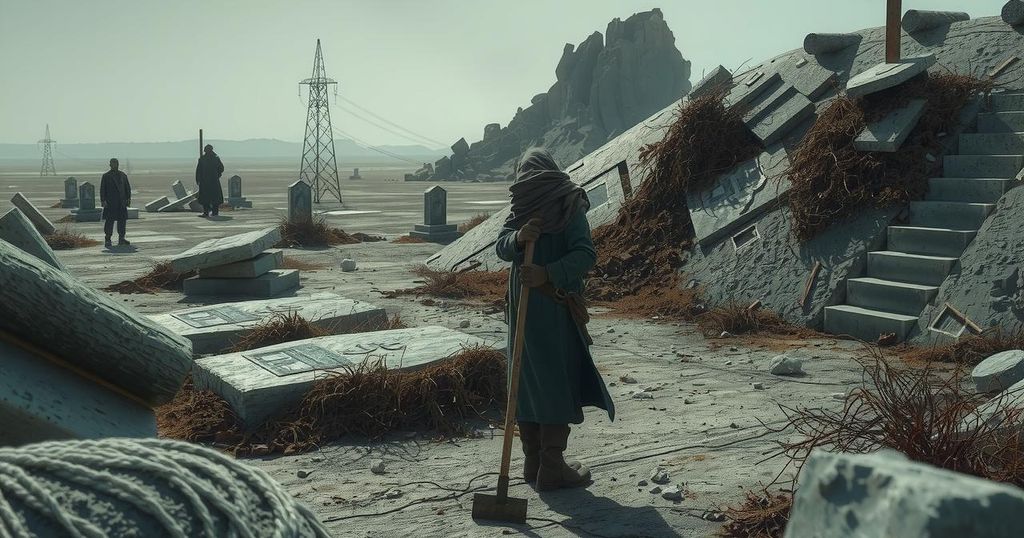Khartoum Gravedigger Overwhelmed as Civil War Rages in Sudan
Sudanese Armed Forces have regained control of the presidential palace in Khartoum from the RSF amidst ongoing civil war. Despite military advances, civilians suffer immensely with increasing casualties and humanitarian crises. Abidin Durma, the Omdurman gravedigger, epitomizes the escalating death toll, while families like the Abazar’s face the tragic consequences of war. Full control for the army may reduce immediate risks, yet the broader conflict’s legacy will haunt Sudan for years to come.
The civil conflict in Sudan continues unabated, particularly in Khartoum, where the Sudanese Armed Forces have recently reclaimed the presidential palace from the Rapid Support Forces (RSF). This strategic gain marks a significant moment as the army aims to assert control over the capital once more, two years after being expelled from the city. Despite military successes, the civilian population suffers immensely due to the rampant violence and humanitarian crises prompted by the ongoing war.
In the past weeks, government troops have successfully regained territory in northern and eastern districts of Khartoum, intensifying their efforts to fortify positions. The latest military offensive commenced a week prior, with reports indicating an effective rallying of forces, including an engagement where the army destroyed an RSF convoy. Significant military actions have been visually documented, reflecting the intensity of the ongoing conflict.
One individual deeply affected by the war is Abidin Durma, known in Omdurman as the ‘gravedigger.’ His experiences underscore the heavy toll on civilians, as he oversees the burial of numerous victims daily. His family’s history is intertwined with the Mahdist movement in Sudan, and he now witnesses the desperate reality of expanding graves in the Ahmed Sharfi Cemetery due to the escalating violence.
Throughout the conflict, Mr. Durma reports burying an alarming number of bodies, often between 25 to 50 each day, revealing a harrowing picture of the human cost of this civil strife. The systematic violence has included devastating artillery fire leading to numerous fatalities, with many victims being innocent civilians caught in the crossfire. Reports indicate that both the military and the RSF have been implicated in wartime atrocities.
Compounding the tragedy, families, such as that of Abazar Abdel Habib, are mourning the loss of loved ones due to indiscriminate shelling. He expresses a determination to nurture the next generation through their trauma, maintaining the importance of sharing truths about the war with children left orphaned by the conflict.
Residents of Omdurman share horrific accounts of daily life under fire, reflecting a reality where normalcy becomes unattainable. Many seek refuge in any safe spaces available, including under beds during shelling incidents, while others adapt their routines to navigate the persistent threat of violence. The continuous cycle of fear and grief exemplifies the long-term impact this war will have on Sudanese society.
While a potential recapture of Khartoum by the army may alleviate some immediate dangers, it is anticipated that the broader conflict will persist, leaving lasting scars on the nation’s psyche and fabric. The humanitarian implications of this war will haunt Sudan and its people for years to come.
In summary, the civil war in Sudan remains a catastrophic humanitarian crisis, particularly in Khartoum, where military actions have led to significant territorial gains for government forces. Civilians, however, continue to bear the brunt of the violence, as illustrated by the experiences of individuals like Abidin Durma and Abazar Abdel Habib. The prospect of a military victory seems to promise a momentary reprieve for Khartoum, yet the enduring repercussions of the conflict ensure a long road towards healing for the affected populace.
Original Source: www.bbc.co.uk




Post Comment